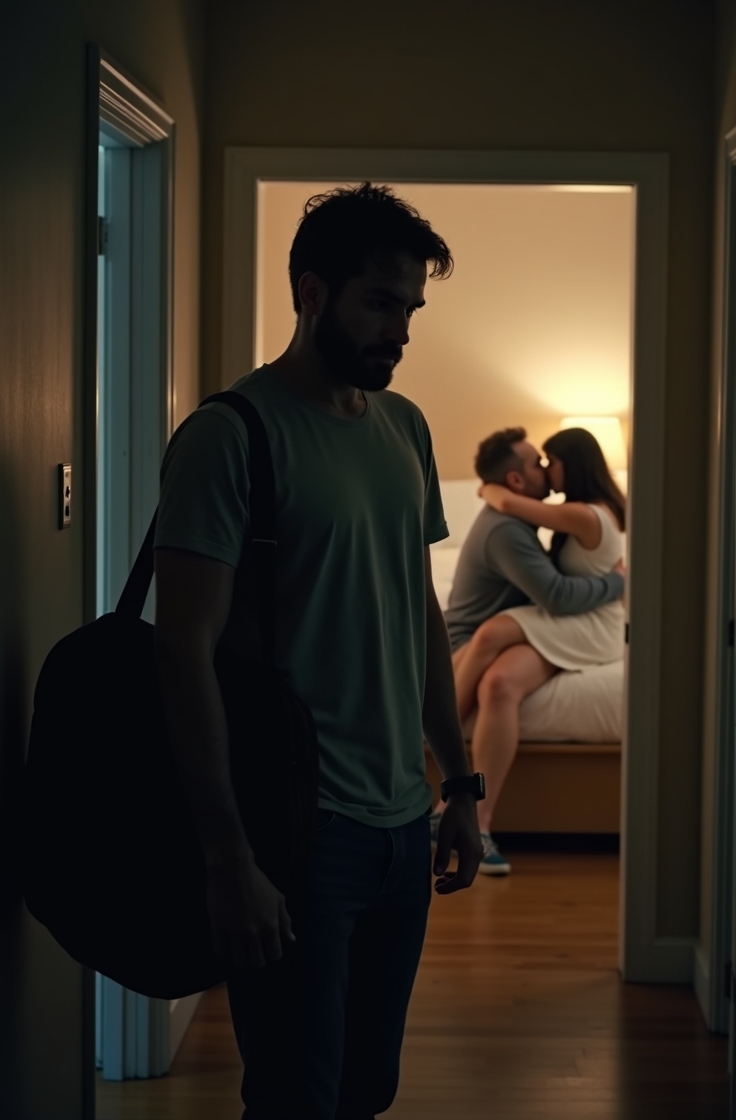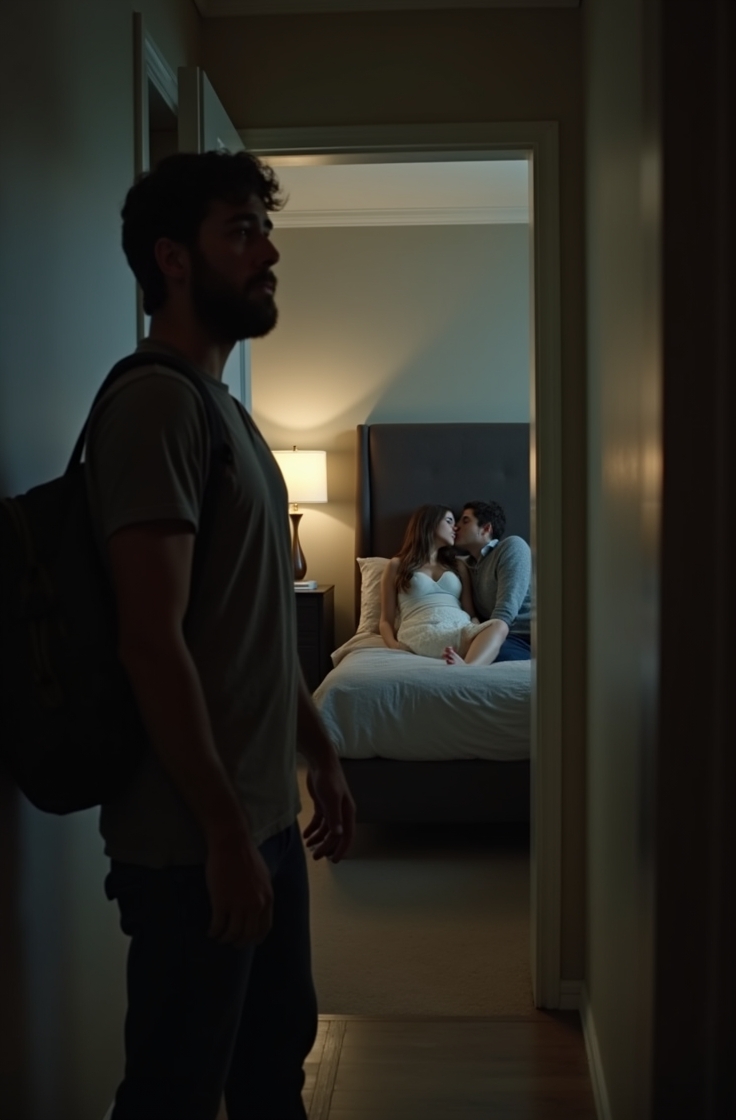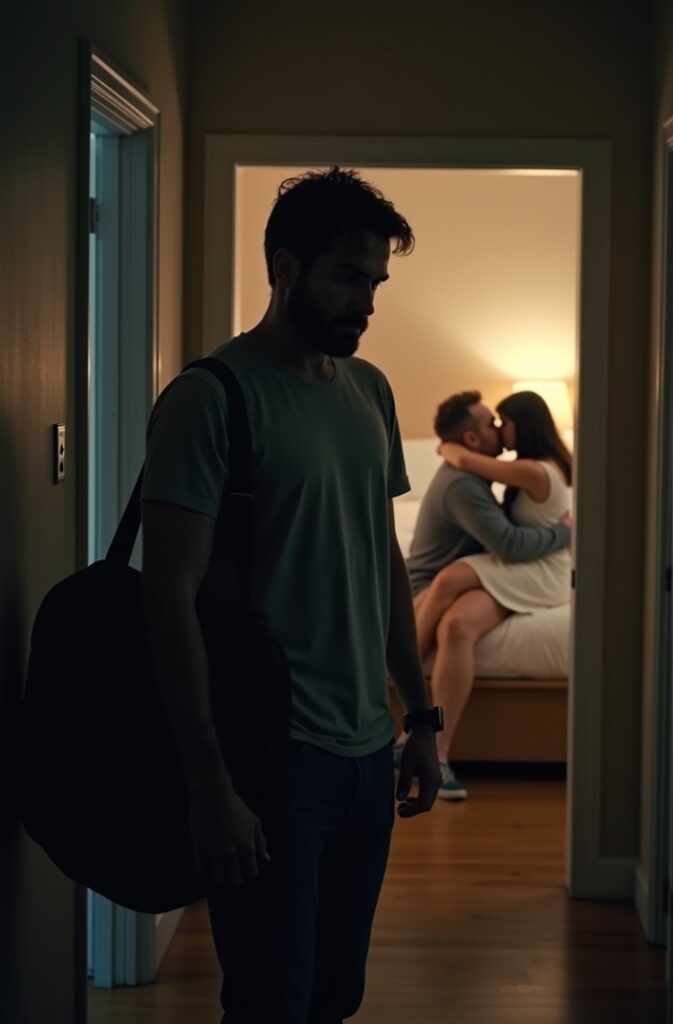The Day I Came Home Early: What My Basement Door Was Really Protecting…
Some wounds aren’t visible on the body—they’re buried in places you don’t let anyone else touch. For me, it was the basement. A locked door, a code only I knew, a secret that lived below ground. I thought I was keeping my family safe by locking it. But the truth? The basement wasn’t protecting them. It was protecting me from the reality I wasn’t ready to face.
This is the story of how one unexpected hospital discharge, one crookedly parked car, and one forbidden door shattered my life—and left me asking questions I still don’t know how to answer.
My son, Michael, had always been gentle. Too gentle. The kind of man who trusted easily, forgave quickly, loved without caution. That’s why, when he brought Emily home—a woman with bright eyes but sharper ambition—I felt my stomach tighten.
Emily smiled at everyone, but her smile never reached her eyes. She always seemed to be searching for something: the most expensive wine at dinner, the most expensive brand on a watch, the softest target in the room.
When they married, I kept my doubts to myself. Michael was happy, and wasn’t that what mattered? But happiness and blindness often look the same.
Not long after their wedding, I changed the basement lock to a coded system. My excuse? “Old documents, sentimental stuff, nothing important.” Michael accepted that explanation. Emily didn’t. I caught her staring at the keypad more than once. Her curiosity wasn’t casual—it was calculated.
And I knew. One day, she’d try.

The heart doesn’t ask permission before it breaks. Mine gave out one Tuesday evening. Chest pain, collapsing in the kitchen, the dizzy blur of paramedics shouting numbers I didn’t understand.
The hospital was cold. Nights bled into each other, a carousel of beeping monitors and sleepless hours. I waited for Sarah, my wife, to come. She never did.
On the phone, she said softly, “Hospitals make me panic, Daniel. You know that. The smell, the fluorescent lights—I just can’t.”
I wanted to believe her. But deep inside, a small voice whispered: If she wanted to be here, she would be.
Three days later, the nurse smiled. “Mr. Foster, you’re doing wonderfully. The doctor says you’re free to go home today.”
Free.
I forced a smile. But the word didn’t feel like freedom. It felt like a warning.
The cab pulled into the driveway just as dusk painted the sky a bruised purple. I pictured Sarah waiting inside, perhaps anxious but relieved, perhaps preparing dinner. I wanted to believe in that version of her.
But Michael’s car was already there. Parked fast, crookedly, wheels turned awkwardly as if he’d stopped in a hurry.
Odd.
I paid the driver, grabbed my small bag, and walked to the door. The house was dark, except for a faint glow from upstairs. The silence wasn’t comforting. It was suffocating.
I didn’t call her name. Instinct told me not to.
Every step up the stairs creaked like thunder in my chest. My breath came shallow.
The bedroom door was cracked open. Just a sliver. Enough to see shadows moving inside.
I nudged the door wider.
And froze.
Sarah. My wife of sixteen years. Entwined with a man I didn’t recognize. My bed. Our bed.
The wedding photo on the nightstand seemed to tilt toward me, mocking, as though it had been watching all along.
I stood there. Ten seconds, maybe more. Long enough to burn the image into my soul.
They didn’t see me. Didn’t hear me.
I turned and walked away without a word. No shouts. No broken lamps. No begging.
By the time I reached the bottom step, I already knew: everything would change tonight.
That night, as I sat in my study, the phone rang. Michael.
“Dad,” he panted, voice frantic. “Emily tried to open the basement. She said you changed the code. She wouldn’t stop until the alarm went off. She kept saying there’s something down there you don’t want anyone to see. What’s in there?”
I swallowed hard. My heart raced again, but this time it wasn’t medical.
“Did she get in?” I asked quietly.
“No. But she swore she would. Dad… why are you hiding things?”
The truth was simple, but devastating. The basement didn’t hold money or treasure. It held boxes of evidence.
Years ago, I had discovered Sarah’s lies by accident. A receipt crumpled in her purse. A hotel reservation under a different name. Emails printed out by mistake.
The betrayal wasn’t new. It wasn’t one night, one stranger. It was years of secret rendezvous, hidden phone calls, coded messages in plain sight.
I had gathered the evidence, piece by piece, terrified of confronting her but more terrified of losing her. I packed it into boxes—photos, receipts, notes. Proof I told myself I’d never need, because if I never opened those boxes, maybe the betrayal wasn’t real.
The basement became my graveyard of denial.
And Emily? She had sensed it. She wasn’t chasing love, or even just money. She was chasing leverage. She wanted something she could use against me, against Michael, against anyone who got in her way.
The next morning, I confronted Sarah. She was calm, too calm, sipping tea as though my world hadn’t collapsed.
“Why?” I whispered.

She glanced at me, unflinching. “Because I could. Because you never asked the questions you should have.”
Her words hit harder than any blow.
Michael walked in at that moment. He froze, listening, as the truth unraveled.
“Mom?” His voice cracked.
Sarah didn’t even blink. “Your father kept secrets, too. Don’t look at me like I’m the only one.”
Michael turned to me, confusion and pain in his eyes. “Is that true? What’s in the basement, Dad?”
I wanted to lie. To protect him. But the weight of years of silence pressed too hard.
“Proof,” I said finally. “Proof of everything she’s done.”
The look on his face—betrayal layered on betrayal—nearly broke me.
Sarah left that week. No tears. No apologies. Just absence, like she had rehearsed it.
Emily didn’t last much longer. Her obsession with the basement gave her away. Michael finally saw her for what she was: an opportunist, not a partner.
By the end of the month, the house was empty except for me. Empty, but quiet. A different kind of silence—lonely, yes, but honest.
Sometimes I sit on the basement stairs, staring at the locked door. I think about the man I was before the hospital, before the crooked car, before I pushed that bedroom door open.
I tell myself the basement is just a room. Just wood and cement and boxes. But I know better. It’s the weight of every question I was too afraid to ask, every truth I buried to protect a lie.
Sarah’s betrayal wasn’t sudden. It was slow poison, drip by drip, over years. And I let it happen, because I thought silence was easier than confrontation.
Now, the basement is my reminder. Of what I ignored. Of what I lost. Of the cost of pretending not to see.
And I still wonder:
When the truth is too painful to face, is it better to keep the basement locked forever—or to open the door and let everything inside finally breathe?


